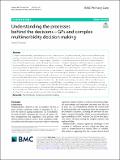Understanding the processes behind the decisions – GPs and complex multimorbidity decision making
Abstract
Complex multimorbidity, defined either as three or more chronic conditions affecting three or more different body systems or by the patients General Practitioner (GPs), is associated with various adverse outcomes. Understanding how GPs reach decisions for this complex group of patients is currently under-researched, with potential implications for health systems and service delivery. Schuttner and colleagues, through a qualitative approach, reported that internal factors of individuals (decisions tailored to patients; Primary Care Physician (PCP) consultation style; care planning towards an agreed goal of care), external factors within the environment or context of encounter (patient access to healthcare; organizational structures acting as barriers), and relationship-based factors (collaborative care planning; decisions within a dynamic patient clinician relationship) all influence care planning decisions. There are other important findings which have broader relevance to the literature such as the ongoing separation of physical and mental health which persist even within integrated care systems, GPs continue to prioritize continuity of care and that organizational barriers are reported as factors in clinician decision-making for patients. More broadly, the work has proved valuable in extending previously reported findings surrounding care coordination, and limitation of current guidelines for patients with complex multimorbidity. Work-load in general practice is increasing due to an ageing population, increasing prevalence of multimorbidity and polypharmacy, and transfer of clinical activities from secondary to primary care. The future for GPs is more complexity in the clinic room, understanding how GPs make decisions and how this can be supported is crucial for the sustainability for general practice.
Citation
Hughes , L D 2022 , ' Understanding the processes behind the decisions – GPs and complex multimorbidity decision making ' , BMC Primary Care , vol. 23 , 162 . https://doi.org/10.1186/s12875-022-01781-0
Publication
BMC Primary Care
Status
Peer reviewed
ISSN
2731-4553Type
Journal item
Description
LDH is grateful to National Education Scotland for funding the NES Academic Fellowship scheme which has provided the financial means for this work to be performed.Collections
Items in the St Andrews Research Repository are protected by copyright, with all rights reserved, unless otherwise indicated.

